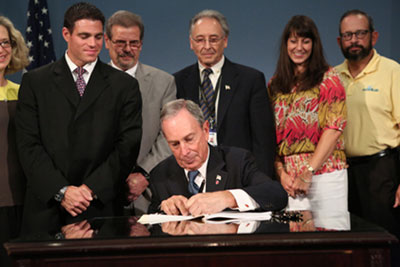|
| Government Relations Highlights — September |
| |
 New York City Mayor Bloomberg Signs 2009 IPC into Law New York City Mayor Bloomberg Signs 2009 IPC into Law
This legislation amends the New York City Plumbing Code to bring it up-to-date with the 2009 edition of the International Plumbing Code, with modifications that reflect the unique character of the City. In New York City, Local Law 99 of 2005 and Local Law 33 of 2007 require the Department of Buildings to revise the codes – including the Plumbing Code – every three years. Specific revisions to the previous plumbing code include clarifying requirements for sewage connection to reduce the time needed to obtain a permit, new standards for on-site stormwater disposal that will reduce construction costs for small property owners, and water standards for water recycling systems. These and other improvements offered by this legislation will help to address public health, and reduce some bureaucratic hurdles to make it easier to build while taking into account sustainability and environmental issues.
The Department of Buildings revised the Plumbing Code through a collaborative committee process that included architects, engineers, and representatives from the construction industry, labor, real estate, and government, including the Department of Environmental Protection and the Department of Health and Mental Hygiene. ICC Government Relations VP Dottie Harris works closely with the NYC Department of Buildings making sure we provide any support and assistance needed to the review Committees. |
| |
| |
Government and Industry Representatives Advocate for Adoption and Enforcement of Building Codes
Industry and government officials testified before the U.S. House of Representatives about the importance of the adoption and enforcement of building codes developed through the consensus processes, such as the International Code Council’s International Codes (I-Codes). The hearing held by a Congressional subcommittee was in support of H.R. 2069, the Safe Building Code Incentive Act. The legislation aims to provide states with additional disaster relief funding in exchange for adopting and enforcing updated building codes.
Among those supporting the codes system and code officials were David Miller, Associate Administrator of the Federal Insurance and Mitigation Administration (a division of FEMA), Julie Rochman, Chief Executive Officer of the Insurance Institute for Business & Home Safety (IIBHS), and Chief Hank Clemmensen of the International Association of Fire Chiefs (IAFC). Both the IIBHS and IAFC are a part of the BuildStrong Coalition along with the ICC, whose mission is to promote stronger building codes across the nation.
With code adoption and enforcement being primarily a state and local government issue, H.R. 2069 is one of the few opportunities ICC has to affect building code practices on a national legislative level, and in a sea of bills on every topic from around the country, strong allies and coalition-building are a necessity in order to effect change inside the Beltway.
The GR department’s Federal relations experts work tirelessly to seek out and make connections with like-minded organizations who understand the importance of strong and safe building codes and are willing to stand with ICC in support of our common purpose, and when they come from inside the Executive Branch itself and from other nationally-recognized nonprofit organizations, ICC’s voice becomes that much more persuasive and easily heard above the din in the halls of Congress. |
| |
| |
Senator Lieberman Named CFSI Legislator of the Year
On Wednesday, August 8th, Bill Webb, Executive Director of the Congressional Fire Services Institute (CFSI), presented the CFSI 2012 Legislator of the Year Award to Senator Joseph Lieberman (CT) at an event at the Wallingford Fire Department in Wallingford, CT. Senator Lieberman, who is retiring at the end of this year, has distinguished himself by sponsoring the Fire Grants Reauthorization Act and the United States Fire Administration Reauthorization Act. Both measures are at the top of the fire services' legislative priorities. In addition, Senator Lieberman has been active in a number of other initiatives, including post-Katrina FEMA reform.
Senator Lieberman will be missed by the codes and standards community, as his commitment to upholding safety and sustainability across the nation and recognizing building safety as a bipartisan issue were earlier proven in his sponsorship of the Codes and Safety for the Americas Act (CASA Act), a joint ICC, AIA, and ASTM legislative effort that passed, with his support as an amendment in the Foreign Relations Authorization Act on September 30, 2002. |
| |
|

